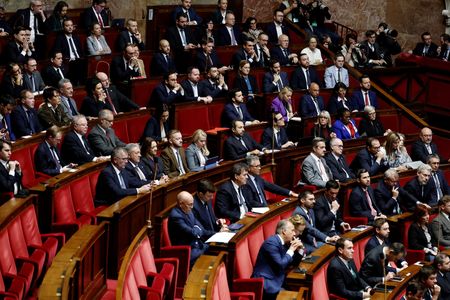By Elizabeth Pineau and Gabriel Stargardter
PARIS (Reuters) -French Prime Minister Sebastien Lecornu faces two perilous votes of no-confidence in parliament on Thursday but is likely to survive after pledging to suspend President Emmanuel Macron’s landmark pension reform to win support from the left.
Lecornu, already France’s shortest-serving prime minister in modern times before he was re-appointed last week, had faced the prospect of an even shorter second stint in office until he made the pensions reform concession on Tuesday.
The Socialists, who hold the key to Lecornu’s political survival, welcomed his move, saying they would not support the two no-confidence motions on Thursday, one from the far-left and the other from the far-right National Rally.
Despite Lecornu’s offer to mothball the reform until after the 2027 presidential election, the result of the votes is expected to be close, with potential rebels from the Socialists or conservative Republicans injecting a measure of doubt.
“If I were a member of parliament, I would vote for (the no-confidence measure)… because I believe that today we are being presented with a Socialist budget, and I am not a Socialist,” Republicans party vice-president Florence Portelli told RTL radio. “Our voters expect us to have values.”
LECORNU’S GOVERNMENT SEEN SURVIVING BY SLIM MARGIN
By putting the pension reform on the chopping block, Lecornu threatens to kill off one of Macron’s main economic legacies at a time when France’s public finances are in a perilous state, leaving the president with little in the way of domestic achievements after eight years in office.
There are 265 lawmakers in parliament from parties that have said they will vote to topple Lecornu, with only 289 votes needed for his ouster. BFM TV reported that Lecornu’s margin of survival could be as narrow as 10 votes.
If Lecornu falls, he and his ministers would have to immediately resign, and Macron would face huge pressure to call a snap parliamentary election that would plunge France back into crisis.
If he survives, Lecornu still faces weeks of arduous negotiations in parliament over passing a slimmed-down 2026 budget during which he could be toppled at any point.
After winning the pensions concession, the Socialists on Wednesday set their sights on including a tax on billionaires in the 2026 budget, underlining just how weak Lecornu’s hand is in the negotiations.
POLITICAL KRYPTONITE
France is in the midst of its worst political crisis in decades as a succession of minority governments seek to push deficit-reducing budgets through a truculent legislature split into three distinct ideological blocs.
Reforming France’s generous pension system has been political kryptonite ever since Socialist President Francois Mitterrand cut the retirement age to 60 from 65 in 1982.
In France, the average effective retirement age is just 60.7, compared to the OECD average of 64.4.
Macron’s reform raised the statutory retirement age by two years to 64 by 2030. Although that only brings French policy into line with other European Union member states, it chips away at a cherished social benefit beloved by the left.
VOTE ON PENSION REFORM SUSPENSION IN NOVEMBER
Lecornu told lawmakers on Wednesday he would propose in November an amendment to the social security financing law in order to suspend the reform.
Some leftist lawmakers told the Socialists that Lecornu was setting up an ambush. By placing a clause to suspend the pension reform there, the Socialists could be forced to swallow other measures that they disapprove of, they said.
“They’ve been duped!” senior hard-left lawmaker Manuel Bompard told TF1 television.
(Additional reporting by Alessandro ParodiWriting by Gabriel Stargardter; Editing by Sharon Singleton and Gareth Jones)














